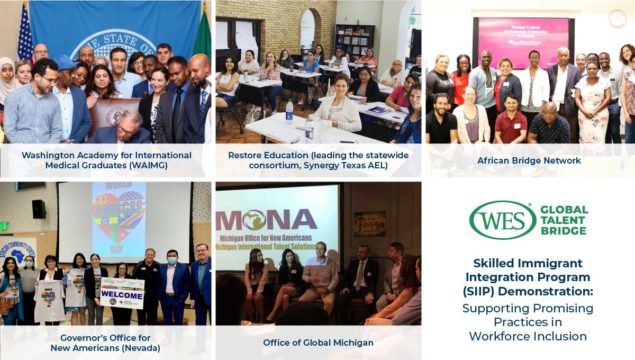The Future of Work – for those in human resources, employment, or academic services, this is a phrase that is becoming increasingly familiar. Shaped by factors such as technological advances, ageing populations, and increasing global mobility, the ‘future of work’ represents a time of both challenge and opportunity. Academic institutions are tasked with staying relevant at a time when fewer people are seeking higher education through traditional channels[1], and employers are faced with skills shortages and higher competition for skilled labour[2].
As with any large-scale change, there are opportunities to be found in the transition, and WES believes that immigration (international students and skilled immigrants) is one of the most promising solutions during this time. The Conference Board of Canada estimates that immigration will account for all of Canada’s net labour force growth and one-third of the economic growth rate between 2018 and 2040[3]. For employers and academic institutions to capitalize on this growth they must understand the difference between credential evaluation and credential recognition, and the important role they play in both. Although credential evaluation and credential recognition are often used interchangeably, they refer to two distinct (though related) concepts.
Credential Evaluation
For an internationally educated individual, exploring educational and employment pathways begins with an understanding of the value of the education received outside of their new country of residence. Obtaining a credential evaluation is often the first step a skilled immigrant can take to gain access to employment opportunities outside of their country of education, and for students is a necessary part of applications for further study. Credential evaluation is an expert analysis of internationally-obtained degrees or diplomas. A credential evaluation analyzes education from any country in the world and provides a Canadian or American equivalency. Neither Canada nor the United States has a national education ministry to evaluate international degrees, so employers, regulatory bodies, and academic institutions often rely on independent credential examiners. In some cases, they perform their own evaluations or will accept evaluations completed only by a preferred examiner. A proper credential evaluation can be completed only by experts who have the necessary insight into, and knowledge of, international education systems. World Education Services (WES) is one example of a credential evaluation provider and has delivered evaluations to more than two million people since 1974.
The process for credential evaluation services differs according to their internal processes and requirement. At WES, after an applicant has mailed all required documents to WES for evaluation, a credential examiner is assigned to verify the authenticity of each document. WES considers several factors when formulating an equivalency:
- A country’s educational system
- The status of the institution attended
- The admission requirements to a specific program of study
- The official length of the program
- The depth and breadth of the curriculum covered
- The options for further study of the degree holder
This information is then measured against Canadian or U.S. standards, and all grades and courses converted to the correct Canadian or U.S. equivalency depending upon which country an individual is seeking employment or further education in. Once this initial evaluation has been completed, it is reviewed for accuracy and approval by a senior credential evaluator.
Getting a credential evaluation is an essential step in gaining access to the opportunities that internationally educated individuals have earned by completing their educational qualifications. As explained by Beka Tavartkiladze, senior director, Evaluation Services at World Education Services, “Credential evaluation is a vehicle for gaining the recognition of credentials gained outside of Canada and the United States and is one of the most important aspects of global mobility.”
Credential Recognition
Requiring applicants to provide a credential evaluation is an important part of maintaining standards, but credential recognition is what allows individuals to engage in meaningful ways with academic institutions, regulatory bodies, and ultimately the labour market. Skilled immigrants should be proud of what they have accomplished, and confident in their right to work in their desired field without facing undue hardship. The Lisbon Recognition Convention (LRC), ratified by Canada in August 2018, states that recognition of international credentials should be granted unless a substantial difference can be demonstrated. What does this mean for end users, including employers? Consistent with human rights legislation even prior to the LRC, all end users must be able to demonstrate that their treatment of internationally educated applicants is based on fair, consistent, and non-discriminatory practices.
Shamira Madhany, deputy executive director and managing director, WES Canada, explains, “This is not simply about best practices and recommendations. This is a commitment to which Canada and the United States have signed, signaling that being educated outside of these two countries should not preclude an individual from the benefits of full participation in the labour market.”
Agencies like WES evaluate education and encourage a wider recognition of international credentials, but do not have the authority to insist that employers or other end users accept the report that they provide. WES can provide a written report with an advisory opinion on how an international credential compares to one earned in Canada or the United States, either a course-by-course comparison, or a document-by-document comparison with a high level overview but cannot ensure that the report itself will lead to acceptance into academic programs or employment.
To assist end users in making informed decisions and promote labour market inclusion, WES also conducts research and provides resources. With an extensive catalogue of country profiles, webinars, interactive training sessions, and research reports, if you have a question about international credentials, WES likely has the answer.
Conclusion
Individuals educated abroad rely on employers, regulatory bodies, and academic institutions to recognize their academic credentials. When these credentials are not recognized, individuals can end up underemployed, underpaid, and unable to achieve their aspirations and contribute fully in their new country of residence. In these cases, employers also end up losing out on top talent and highly skilled employees. By empowering skilled immigrants and educating end users on the value and validity of credential evaluation reports, WES believes that there will be higher success rates for labour market inclusion and higher outcomes for employers in terms of productivity and performance.
Are you interested in learning more about the differences between credential evaluation and credential recognition? Watch our on-demand webinar on this topic.
[1] https://nscresearchcenter.org/wp-content/uploads/CurrentTermEnrollmentReport-Spring-2019.pdf
[2] https://www.cfib-fcei.ca/en/research/help-wanted-private-sector-job-vacancies-q1-2019
[3] https://www.conferenceboard.ca/temp/37a7386b-ecf0-4cae-927e-1997e3a3471e/10150_Can’tGoItAlone_BR.pdf
Questions? Comments? We love feedback! Tell us what you think here.
Click here for more from WES Global Talent Bridge.



